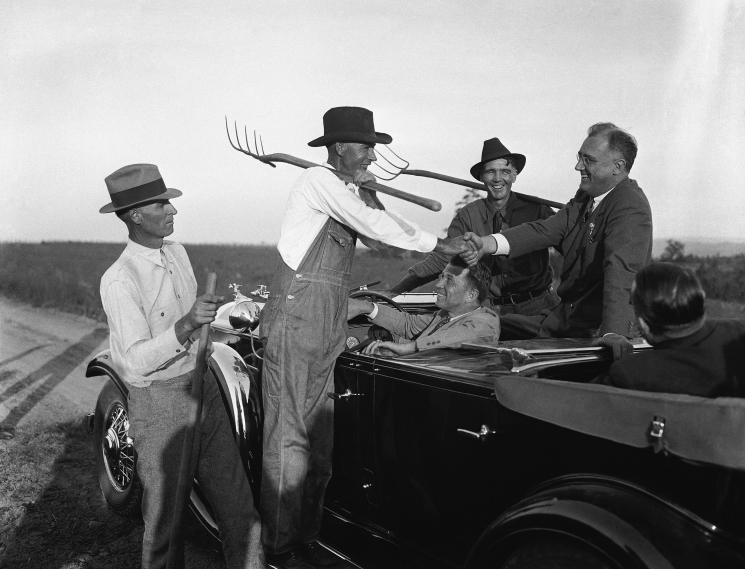Exploring American Histories: Printed Page 696
Exploring American Histories, Value Edition: Printed Page 574
Roosevelt Restores Confidence
As a presidential candidate, Roosevelt presented no clear, coherent policy. He did not spell out how his plans for the country would differ from Hoover’s, but he did refer broadly to providing a “new deal” and bringing to the White House “persistent experimentation.” He pledged to put more faith “in the forgotten man at the bottom of the economic pyramid.” These flights of rhetoric, however, were balanced by the Democratic candidate’s harsh denunciation of Hoover for excessive governmental spending and failure to balance the budget. Roosevelt’s appeal derived more from the genuine compassion he was able to convey than from the specificity of his promises. In this context, Eleanor Roosevelt’s evident concern for people’s suffering and her history of activism made Franklin Roosevelt even more attractive.

Instead of any fixed ideology, Roosevelt followed what one historian has called “pragmatic humanism.” A seasoned politician who understood the need for flexibility, Roosevelt blended principle and practicality. “It is common sense,” Roosevelt explained, “to take a method and try it. If it fails, admit it frankly and try another. But above all, try something.” More than any president before him, FDR, as he became affectionately known, created an expectation among Americans that the federal government would take concrete action to improve their lives. A Colorado woman expressed her appreciation to Eleanor Roosevelt: “Your husband is great. He seems lovable even tho’ he is a ‘politician.’” A textile worker echoed this sentiment: “The president isn’t going to forget us.” The New Deal would take its twists and turns, but Roosevelt never lost the support of the majority of Americans.
Starting with his inaugural address, in which he declared that “the only thing we have to fear is fear itself,” Roosevelt took on the task of rallying the American people and restoring their confidence in the future. Using the power of radio to communicate directly with the American people, Roosevelt delivered regular fireside chats in which he boosted morale and informed his audience of the steps the government was taking to help solve their problems. Not limited to rhetoric, Roosevelt’s New Deal would provide relief, put millions of people to work, raise prices for farmers, extend conservation projects, revitalize America’s financial system, and rescue capitalism.